Post by QPR Report on Sept 20, 2009 12:30:33 GMT
Bump another year - The Doc Turns 92
en.wikipedia.org/wiki/Tommy_Docherty
Teams managed
1961–1967 Chelsea
1967–1968 Rotherham United
1968 Queens Park Rangers
1968–1970 Aston Villa
1970–1971 Porto
1971 Scotland (caretaker)
1971–1972 Scotland
1972–1977 Manchester United
1977–1979 Derby County
1979–1980 Queens Park Rangers
1981 Sydney Olympic
1981 Preston North End
1982–1983 South Melbourne
1983 Sydney Olympic
1984–1985 Wolverhampton Wanderers
1987–1988 Altrincham
His Managerial Record
www.soccerbase.com/managers/manager.sd?manager_id=1232
Herald Sun - Now in his ninth decade of jokes, spats, lies and pies, Tommy Docherty is still at it
Bryan Cooney
20 Sep 2009
En route to Tommy Docherty’s beautiful Derbyshire home, I’m recalling a documentary I made for Radio Four’s Archive Hour last year concerning the steady erosion of the relationship between the media and sports stars.
When the Seagulls Follow the Trawler highlighted the difficulty of maintaining equable associations in an idiosyncratic world distended by money, celebrity and disproportionately-sized egos. Whereas journalists and sportsmen once shared much the same social and fiscal platform, they’re now separated by an area so wide there’s a danger of it being occupied by Somalian pirates.
For reasons that quite escape me, the programme didn’t touch on my friendship with The Doc. This, incredibly, has lasted almost 30 years, ever since I walked into his office at Loftus Road to be informed that he was keen on bringing the exorbitantly-priced Steve Daley from Manchester City to Queens Park Rangers.
The revelation was reported exclusively the next day and I sat back to enjoy the resultant accolades. Unfortunately, the red lights of reality were just about to flash: I tuned into the three o’clock BBC news and learned that Docherty had dismissed the story as a wild fabrication. Accolades? The only thing coming my way was ridicule.
When I remind him of my humiliation, neither shame nor regret is included in his response. Instead, there is raucous laughter. “I was always a lying bastard,” he says. Now, history and one notorious appearance in the High Court when he was admonished by the judge confirms that this may very well be the case. But then you remind yourself that it is not a hanging offence; most, if not all, football managers are apt to play games with the truth.
The thing is you cannot help liking Docherty unless, of course, your name is Alex Ferguson – with whom he shares an almost toxic relationship – or you belong to that segment of his family that never forgave him for deserting their mother, Agnes. Last year, five years after his mum’s death, son Tom released a book of her memoirs that didn’t indicate peace on this earth.
The politics of relationships aside, however, Tommy is great company: wildly incorrigible, outrageously glib, tirelessly ironic. You laugh more in one hour than is normal in a year and the package is quite irresistible, even more so when you consider that he celebrated his 81st birthday last April. Someone obviously has forgotten to inform his body and mind of its octogenarian status.
Today, he is almost as irreverent and iridescent as he was when he was managing, among others, Chelsea, Aston Villa, Scotland and Manchester United. He begins with a story that initially sounds as if it’s apocryphal, but, considering football’s current excesses, may just be nearer the truth than anyone might imagine.
He reveals that one of his former players told him he was visited by the Inland Revenue and warned, unequivocally, that if he didn’t produce £50,000 in back taxes, he would be looking at a jail sentence. Panicking, the man raced upstairs and hauled a big cardboard box from under the bed. He took it downstairs, put it on the table, and said: “Count that.”
After some time, one of the officers told him that he had bad news for him. “What’s the matter?” he asked. “There’s around £500,000 in here,” said the tax inspector. “Oh, f***!” the man muttered, “I’ve brought down the wrong box!”
In my day, we were players trying to become stars. Now they are stars trying to become players Tommy Docherty
This, suggests your host, represents the disagreeable face of football today. Too many people are earning too much money for too little talent. The game, he insists, has gone so far beyond the pale that it will never be seen again in any recognisable form. “The money Manchester City are spending is crazy,” he says. “ I mean, they’ve just signed the boy [Joleon] Lescott from Everton for £22 million. Good centre-half, good player, but where’s the genius?
“It’s crackpot stuff. You look around today and the players have got five or six motors. People ask me what I think of today’s football compared to my time and I say: ‘Well, we were players trying to become stars. Now they are stars trying to become players.’ I mean, our top wage was £14, then £17 and at most £20…till Jimmy Hill came along and f***** it all up.
“Listen, Hill was to football what Jonathan Ross is to CBeebies. When I was with Chelsea, I attended a coaches’ school in Baker Street, and he was in charge. He loved the game but didnae know anything about it. He was probably one of the worst players I’ve ever seen. He once said to me: ‘I’m good in the air.’ I replied: ‘So was Douglas Bader!’
“But, no, something needed changing back in the 1960s, because we were £20 a week slaves, but this? Just look around at the current game. When I think of Finney, Best, di Stefano, geniuses like that – they got buttons compared to the tuppence-halfpenny players of today. I’ve seen some recently who could trap a ball further than I could kick it. When they pass it, they should attach this message: ‘To whom it may concern!’ And they’re getting 50 grand a week and upwards.”
You go back over half a century to sepia photographs and discover that heavy odds were stacked against players being proficient at their trade: the kits were rough and heavy, the footballs even more laden, especially when swollen by rain.
“They were as heavy as Christmas puddings. They absorbed the water, didn’t they? Under the rules of the association, the ball before the game should not weigh less than 13 oz and not more than 14oz. But when the rain got into them, Jesus, talk about being a ton weight. Would you believe I used to have long legs. I was 6ft 5in when I started playing…”
And players in that era were scarcely encouraged to educate themselves in the fine arts of the game.
“At Preston we used to train all morning by running round and round the track. And I remember when I was with Celtic reserves, I had an unlikely conversation with the trainer, Alex Dowdells. ‘We’ve finished our running,’ I says, ‘can I have a ball?’ He replies: ‘You can’t. You’ll get one on Saturday. You’ve got to run round and get fit.’
“Everything was different. Today, the players arrive in Ferraris; then they were associated with Shanks’s ponies. On match days at Preston, I used to leave the house at quarter past one and I was at Deepdale at half-past. I walked with supporters to the game and shared their banter. Autographs? Most of them didnae bother about things like that. Who wanted your f****** autograph unless it was on a cheque? Besides, you’re never going to believe this, but I was quite shy and nervous in those days.”
My mind is still attempting to address the image of a reticent Docherty when we move to international matters. Those players of old managed to overcome all the negatives to become master tradesmen. This was evident even in the early 1970s, when Scotland, under the tutelage of Docherty, could hold its head at altitude. But then, of course, he had players of the calibre of Billy Bremner, Martin Buchan, David Hay and Jimmy Johnstone.
The memory of the latter encourages another bout of good humour in Docherty, “It was my second game and we met in Glasgow. They were all there except Johnstone. We went down to Largs and eventually Jimmy turned up at nine o’clock. “I says: ‘Where have you been wee man?’ He says: ‘This bloke cut me up in the car and I followed him. I tooted my horn but he widnae stop, so I kept on following him tae gie him a piece o’ my mind.’ Jimmy started laughing, so I asked him what was up. He says: ‘The trouble wis he f****** lived in Edinburgh!’”
You ask the former Scotland boss how he feels the country is/was being run by George Burlery *delete as appropriate. He strides unerringly towards the deep end and dives in with the panache of a Tom Daley. “Hey, I’m bloody younger than David Weir. And I’m a better player as well. He’s 39, for Christ sake. What happens when they come down the tunnel at Hampden? Will he be in a wheelchair? Oh, what is international fitba coming tae?
“Who was the oldest player I brought back? Maybe Denis, Denis Law. But he was 30-31. That’s this end of the geriatric ward. But when you’re bringing back a man like Weir at 39, going on 40, I mean…come on! He’s a good pro and I think he’s been a good player, but when I saw his selection, I thought: ‘One foot in the grave, the other on a banana skin!’”
If you conclude from this rather vituperative aside that Docherty is dismissive of manager George Burley‘s credentials, then you are only partially right. But, of course, there’s an edge to everything he says. “George is a nice man and it was a great decision as far as [Barry] Ferguson and [Alan] McGregor were concerned, but I believe he likes a Don Revie, doesn’t he? And I also blame him for letting them get away with it in the first place,. Where was he when all this was going on?
“What’s for sure is that they would never have played for me again, either. Not that Ferguson’s a great player. He was a disaster at Blackburn Rovers. Jesus Christ, he died a death there! I saw him half a dozen times, He had no pace. I’ve seen malt turn quicker. I’m not being disrespectful, he was all right in Scottish football, where with Rangers or Celtic, you’re a cut above the rest.”
It’s not so much an interview as a cabaret, as befits a man who has spent the last 21 years of his life on the after-dinner speaking circuit, But the mere mention of Manchester United massages his serious side. He tells you he hasn’t been to Old Trafford as a spectator for four years now and indeed a return is highly unlikely.
“My daughter Lucy was about to celebrate her birthday and she asked me if there was any chance of going there. I phoned Ken Merritt, the United secretary, and asked him what the prospects were of a couple of tickets. He was very nice and said he’d get me two. They arrived the next day. They invoiced me for 88 quid. I posted the tickets straight back, with a wee note that said: ‘I didn’t know the financial structure of the club was at such a low ebb.’
“A couple of months later, my nephew was coming over from France. He asked me if there was anything on. I told him it was the classic: Liverpool versus Man United. I phoned Liverpool and asked what were the chances of a couple of tickets. No problem, they said. I asked them if there was anywhere we could have a meal. I was told there was a new restaurant and they would book me a table.
“There was even a car park pass waiting for me. When we went into the restaurant before the match, a girl came over to us and handed us two passes for the directors’ box. When I went to pay the bill for the meal, the girl said: ‘Sorry, Mr Docherty, but everything’s with the compliments of Liverpool FC.’
“Spot the difference, eh? The trouble with some people is that they have short memories. Will I go back to Old Trafford? Not if I can help it! In many ways, they’re the biggest club in the world, but in many other ways, they’re the smallest!”
And Ferguson? Will Docherty take his dislike of that man to the grave? “He’ll be gone before me, don’t you worry about that.” So Docherty is planning on staying around for a long time? “F****** longer than him, that’s for sure!”
www.heraldscotland.com/sport/english-football/now-in-his-ninth-decade-of-jokes-spats-lies-and-pies-tommy-docherty-is-still-at-it-1.920879

en.wikipedia.org/wiki/Tommy_Docherty
Teams managed
1961–1967 Chelsea
1967–1968 Rotherham United
1968 Queens Park Rangers
1968–1970 Aston Villa
1970–1971 Porto
1971 Scotland (caretaker)
1971–1972 Scotland
1972–1977 Manchester United
1977–1979 Derby County
1979–1980 Queens Park Rangers
1981 Sydney Olympic
1981 Preston North End
1982–1983 South Melbourne
1983 Sydney Olympic
1984–1985 Wolverhampton Wanderers
1987–1988 Altrincham
His Managerial Record
www.soccerbase.com/managers/manager.sd?manager_id=1232
Herald Sun - Now in his ninth decade of jokes, spats, lies and pies, Tommy Docherty is still at it
Bryan Cooney
20 Sep 2009
En route to Tommy Docherty’s beautiful Derbyshire home, I’m recalling a documentary I made for Radio Four’s Archive Hour last year concerning the steady erosion of the relationship between the media and sports stars.
When the Seagulls Follow the Trawler highlighted the difficulty of maintaining equable associations in an idiosyncratic world distended by money, celebrity and disproportionately-sized egos. Whereas journalists and sportsmen once shared much the same social and fiscal platform, they’re now separated by an area so wide there’s a danger of it being occupied by Somalian pirates.
For reasons that quite escape me, the programme didn’t touch on my friendship with The Doc. This, incredibly, has lasted almost 30 years, ever since I walked into his office at Loftus Road to be informed that he was keen on bringing the exorbitantly-priced Steve Daley from Manchester City to Queens Park Rangers.
The revelation was reported exclusively the next day and I sat back to enjoy the resultant accolades. Unfortunately, the red lights of reality were just about to flash: I tuned into the three o’clock BBC news and learned that Docherty had dismissed the story as a wild fabrication. Accolades? The only thing coming my way was ridicule.
When I remind him of my humiliation, neither shame nor regret is included in his response. Instead, there is raucous laughter. “I was always a lying bastard,” he says. Now, history and one notorious appearance in the High Court when he was admonished by the judge confirms that this may very well be the case. But then you remind yourself that it is not a hanging offence; most, if not all, football managers are apt to play games with the truth.
The thing is you cannot help liking Docherty unless, of course, your name is Alex Ferguson – with whom he shares an almost toxic relationship – or you belong to that segment of his family that never forgave him for deserting their mother, Agnes. Last year, five years after his mum’s death, son Tom released a book of her memoirs that didn’t indicate peace on this earth.
The politics of relationships aside, however, Tommy is great company: wildly incorrigible, outrageously glib, tirelessly ironic. You laugh more in one hour than is normal in a year and the package is quite irresistible, even more so when you consider that he celebrated his 81st birthday last April. Someone obviously has forgotten to inform his body and mind of its octogenarian status.
Today, he is almost as irreverent and iridescent as he was when he was managing, among others, Chelsea, Aston Villa, Scotland and Manchester United. He begins with a story that initially sounds as if it’s apocryphal, but, considering football’s current excesses, may just be nearer the truth than anyone might imagine.
He reveals that one of his former players told him he was visited by the Inland Revenue and warned, unequivocally, that if he didn’t produce £50,000 in back taxes, he would be looking at a jail sentence. Panicking, the man raced upstairs and hauled a big cardboard box from under the bed. He took it downstairs, put it on the table, and said: “Count that.”
After some time, one of the officers told him that he had bad news for him. “What’s the matter?” he asked. “There’s around £500,000 in here,” said the tax inspector. “Oh, f***!” the man muttered, “I’ve brought down the wrong box!”
In my day, we were players trying to become stars. Now they are stars trying to become players Tommy Docherty
This, suggests your host, represents the disagreeable face of football today. Too many people are earning too much money for too little talent. The game, he insists, has gone so far beyond the pale that it will never be seen again in any recognisable form. “The money Manchester City are spending is crazy,” he says. “ I mean, they’ve just signed the boy [Joleon] Lescott from Everton for £22 million. Good centre-half, good player, but where’s the genius?
“It’s crackpot stuff. You look around today and the players have got five or six motors. People ask me what I think of today’s football compared to my time and I say: ‘Well, we were players trying to become stars. Now they are stars trying to become players.’ I mean, our top wage was £14, then £17 and at most £20…till Jimmy Hill came along and f***** it all up.
“Listen, Hill was to football what Jonathan Ross is to CBeebies. When I was with Chelsea, I attended a coaches’ school in Baker Street, and he was in charge. He loved the game but didnae know anything about it. He was probably one of the worst players I’ve ever seen. He once said to me: ‘I’m good in the air.’ I replied: ‘So was Douglas Bader!’
“But, no, something needed changing back in the 1960s, because we were £20 a week slaves, but this? Just look around at the current game. When I think of Finney, Best, di Stefano, geniuses like that – they got buttons compared to the tuppence-halfpenny players of today. I’ve seen some recently who could trap a ball further than I could kick it. When they pass it, they should attach this message: ‘To whom it may concern!’ And they’re getting 50 grand a week and upwards.”
You go back over half a century to sepia photographs and discover that heavy odds were stacked against players being proficient at their trade: the kits were rough and heavy, the footballs even more laden, especially when swollen by rain.
“They were as heavy as Christmas puddings. They absorbed the water, didn’t they? Under the rules of the association, the ball before the game should not weigh less than 13 oz and not more than 14oz. But when the rain got into them, Jesus, talk about being a ton weight. Would you believe I used to have long legs. I was 6ft 5in when I started playing…”
And players in that era were scarcely encouraged to educate themselves in the fine arts of the game.
“At Preston we used to train all morning by running round and round the track. And I remember when I was with Celtic reserves, I had an unlikely conversation with the trainer, Alex Dowdells. ‘We’ve finished our running,’ I says, ‘can I have a ball?’ He replies: ‘You can’t. You’ll get one on Saturday. You’ve got to run round and get fit.’
“Everything was different. Today, the players arrive in Ferraris; then they were associated with Shanks’s ponies. On match days at Preston, I used to leave the house at quarter past one and I was at Deepdale at half-past. I walked with supporters to the game and shared their banter. Autographs? Most of them didnae bother about things like that. Who wanted your f****** autograph unless it was on a cheque? Besides, you’re never going to believe this, but I was quite shy and nervous in those days.”
My mind is still attempting to address the image of a reticent Docherty when we move to international matters. Those players of old managed to overcome all the negatives to become master tradesmen. This was evident even in the early 1970s, when Scotland, under the tutelage of Docherty, could hold its head at altitude. But then, of course, he had players of the calibre of Billy Bremner, Martin Buchan, David Hay and Jimmy Johnstone.
The memory of the latter encourages another bout of good humour in Docherty, “It was my second game and we met in Glasgow. They were all there except Johnstone. We went down to Largs and eventually Jimmy turned up at nine o’clock. “I says: ‘Where have you been wee man?’ He says: ‘This bloke cut me up in the car and I followed him. I tooted my horn but he widnae stop, so I kept on following him tae gie him a piece o’ my mind.’ Jimmy started laughing, so I asked him what was up. He says: ‘The trouble wis he f****** lived in Edinburgh!’”
You ask the former Scotland boss how he feels the country is/was being run by George Burlery *delete as appropriate. He strides unerringly towards the deep end and dives in with the panache of a Tom Daley. “Hey, I’m bloody younger than David Weir. And I’m a better player as well. He’s 39, for Christ sake. What happens when they come down the tunnel at Hampden? Will he be in a wheelchair? Oh, what is international fitba coming tae?
“Who was the oldest player I brought back? Maybe Denis, Denis Law. But he was 30-31. That’s this end of the geriatric ward. But when you’re bringing back a man like Weir at 39, going on 40, I mean…come on! He’s a good pro and I think he’s been a good player, but when I saw his selection, I thought: ‘One foot in the grave, the other on a banana skin!’”
If you conclude from this rather vituperative aside that Docherty is dismissive of manager George Burley‘s credentials, then you are only partially right. But, of course, there’s an edge to everything he says. “George is a nice man and it was a great decision as far as [Barry] Ferguson and [Alan] McGregor were concerned, but I believe he likes a Don Revie, doesn’t he? And I also blame him for letting them get away with it in the first place,. Where was he when all this was going on?
“What’s for sure is that they would never have played for me again, either. Not that Ferguson’s a great player. He was a disaster at Blackburn Rovers. Jesus Christ, he died a death there! I saw him half a dozen times, He had no pace. I’ve seen malt turn quicker. I’m not being disrespectful, he was all right in Scottish football, where with Rangers or Celtic, you’re a cut above the rest.”
It’s not so much an interview as a cabaret, as befits a man who has spent the last 21 years of his life on the after-dinner speaking circuit, But the mere mention of Manchester United massages his serious side. He tells you he hasn’t been to Old Trafford as a spectator for four years now and indeed a return is highly unlikely.
“My daughter Lucy was about to celebrate her birthday and she asked me if there was any chance of going there. I phoned Ken Merritt, the United secretary, and asked him what the prospects were of a couple of tickets. He was very nice and said he’d get me two. They arrived the next day. They invoiced me for 88 quid. I posted the tickets straight back, with a wee note that said: ‘I didn’t know the financial structure of the club was at such a low ebb.’
“A couple of months later, my nephew was coming over from France. He asked me if there was anything on. I told him it was the classic: Liverpool versus Man United. I phoned Liverpool and asked what were the chances of a couple of tickets. No problem, they said. I asked them if there was anywhere we could have a meal. I was told there was a new restaurant and they would book me a table.
“There was even a car park pass waiting for me. When we went into the restaurant before the match, a girl came over to us and handed us two passes for the directors’ box. When I went to pay the bill for the meal, the girl said: ‘Sorry, Mr Docherty, but everything’s with the compliments of Liverpool FC.’
“Spot the difference, eh? The trouble with some people is that they have short memories. Will I go back to Old Trafford? Not if I can help it! In many ways, they’re the biggest club in the world, but in many other ways, they’re the smallest!”
And Ferguson? Will Docherty take his dislike of that man to the grave? “He’ll be gone before me, don’t you worry about that.” So Docherty is planning on staying around for a long time? “F****** longer than him, that’s for sure!”
www.heraldscotland.com/sport/english-football/now-in-his-ninth-decade-of-jokes-spats-lies-and-pies-tommy-docherty-is-still-at-it-1.920879


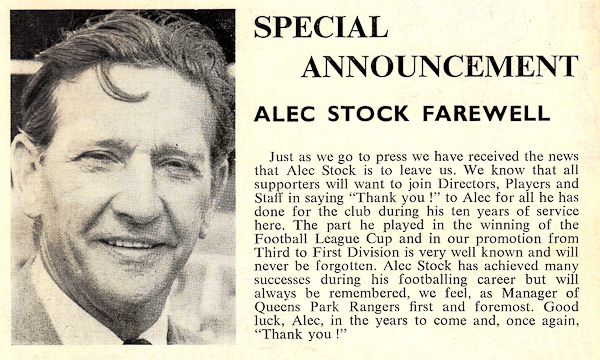
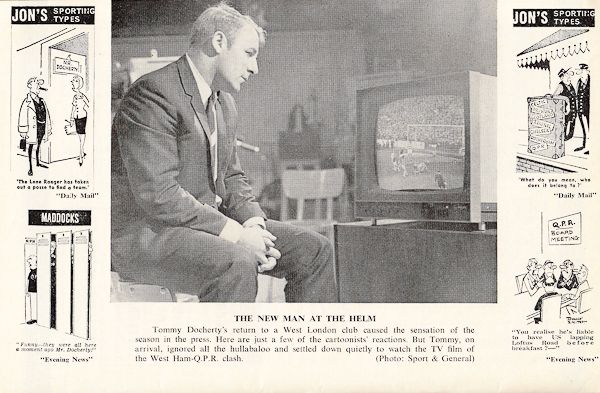
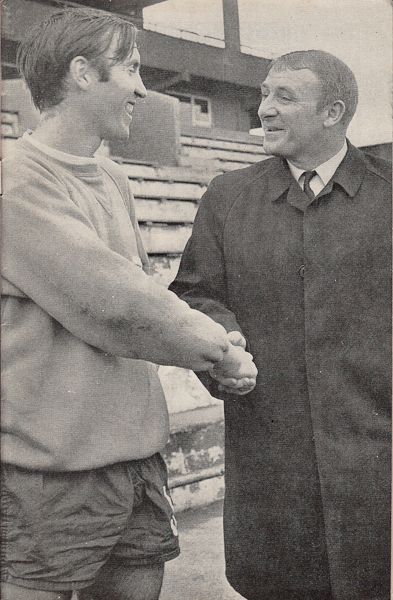
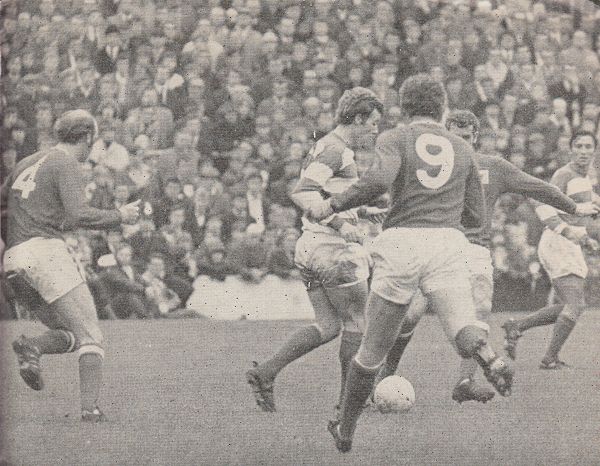
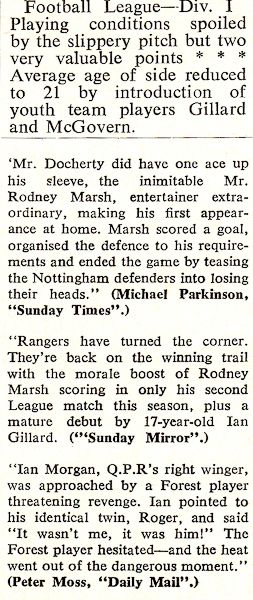
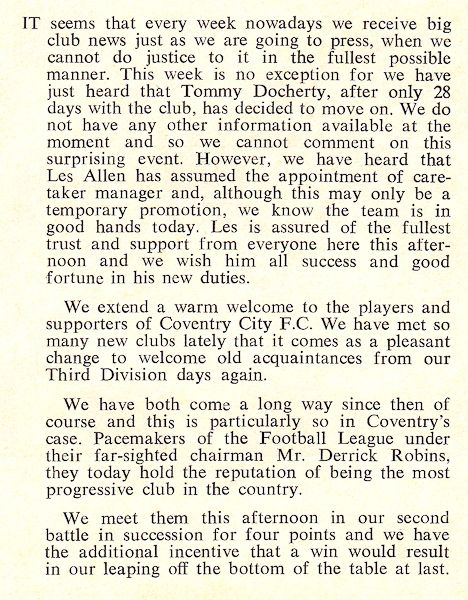
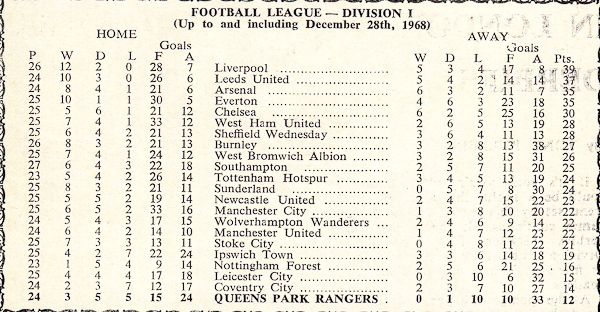
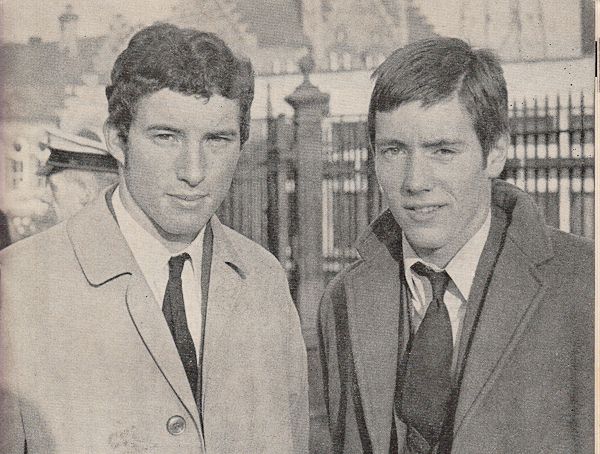






 Terry Venables
Terry Venables